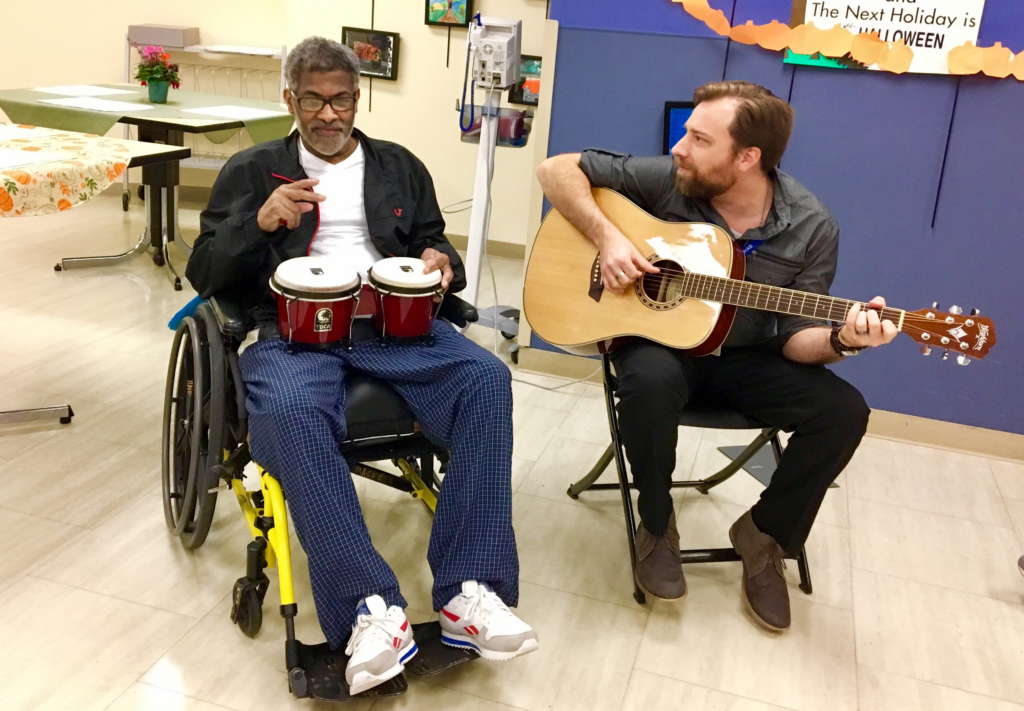Music has been a universal language for centuries, transcending cultures and generations. Its ability to evoke emotions, spark memories, and move us physically is undeniable. But did you know that music can also be a powerful tool for improving mental health?
Music therapy is an evidence-based healthcare profession that uses music interventions to address various mental health concerns. A board-certified music therapist tailors treatment plans using music listening, creating, playing instruments, and movement to achieve specific goals, all within a therapeutic relationship.
How Does Music Therapy Work?
Our brains are intricately wired to respond to music. When we listen to music, various brain regions light up, including those associated with emotions (like the limbic system), memory (like the hippocampus), and movement (like the motor cortex). Music therapy capitalizes on these connections to produce a range of therapeutic effects:
Stress and Anxiety Reduction:
Physiological Impact:
Reduced Cortisol Levels: Cortisol is often referred to as the “stress hormone” because it is released by the body in response to stress. Studies have shown that listening to music can lead to a decrease in cortisol levels, promoting feelings of relaxation and well-being https://www.ncbi.nlm.nih.gov/pmc/articles/PMC9205498/.
Lower Blood Pressure and Heart Rate: Listening to music can also have a calming effect on the cardiovascular system, leading to lower blood pressure and heart rate. It can be particularly beneficial for individuals who experience anxiety-related symptoms like heart palpitations or racing thoughts.
Muscle Relaxation: Music can also help relax tense muscles, further contributing to a feeling of overall calmness and stress reduction.
Psychological Impact:
Distraction: Upbeat or fast-tempo music can provide a distraction from anxious thoughts and worries. By focusing on the rhythm and melody of the music, individuals can temporarily shift their attention away from negative thought patterns.
Mood Elevation: Music can have a mood-lifting effect by triggering the release of dopamine, a neurotransmitter associated with pleasure and reward. It can help to counteract feelings of negativity and promote a more positive outlook.
Sense of Control: Engaging with music through activities like singing or playing an instrument can provide a sense of control and mastery, which can be helpful for individuals struggling with anxiety or feelings of helplessness.
Mood Enhancement:
Neurochemical Impact:
Dopamine Release: When we listen to music we enjoy, the brain releases dopamine, a neurotransmitter associated with pleasure, reward, and motivation. This surge in dopamine can significantly improve mood and counteract feelings of depression or low mood.
Other Neurotransmitters: Music can also influence the release of other neurotransmitters, such as serotonin and oxytocin, which play a role in regulating emotions like happiness, well-being, and social bonding. These combined neurochemical changes contribute to an overall positive emotional state.
Psychological Impact:
Emotional Expression and Processing: Engaging in music activities like singing, playing instruments, or composing music provides a safe and expressive outlet for emotions. It can be particularly beneficial for individuals struggling to express themselves verbally or those experiencing difficulties like anxiety or depression.
Sense of Accomplishment and Self-Expression: Creating music, mastering an instrument, or simply improving one’s singing skills can foster a sense of accomplishment and self-expression. These feelings of success and self-efficacy can boost self-esteem and contribute to a more positive outlook.
Nostalgia and Positive Memories: Certain songs or musical genres can evoke strong nostalgia and trigger positive memories, leading to improved mood and emotional well-being. This phenomenon is often referred to as the “reminiscence bump”, where individuals readily recall positive memories associated with specific music from their past.
Improved Emotional Regulation:

Multiple Avenues for Expression:
Music therapy offers various avenues for non-verbal expression, including:
Creating music: Composing or improvising music allows individuals to express emotions through melody, rhythm, and instrumentation.
Moving to music: Engaging in dance or movement therapy allows individuals to express emotions physically, which can be particularly helpful for those who have difficulty expressing themselves verbally.
Listening to music: Carefully selected music can evoke specific emotions, allowing individuals to explore and acknowledge their feelings in a safe space.
Emotional Processing:
Controlled Exploration: By listening to, creating, or moving to music, individuals can explore a wide range of emotions in a controlled and supported environment. This safe space allows them to become more aware of their emotional responses and begin to understand the connections between their emotions, thoughts, and behaviors.
Developing Coping Mechanisms: Through the exploration of emotions in music therapy, individuals can begin to develop healthier coping mechanisms for managing difficult emotions in their daily lives. It may involve learning to
1- Identify their emotions.
2- Healthily express their emotions.
3- Manage and regulate their emotional responses.
Cognitive Functioning:
Neuroplasticity: Research suggests that music therapy can improve cognitive functions like memory, attention, and problem-solving by stimulating neuroplasticity, the brain’s ability to adapt and change. It can be beneficial for individuals with conditions like dementia, Alzheimer’s disease, or brain injuries https://pubmed.ncbi.nlm.nih.gov/29991131/.
Socialization and Communication:
Social Interaction:
Music therapy can provide valuable opportunities for social interaction and communication, especially in group sessions. By participating in musical activities together, individuals can build rapport, develop communication skills, and foster a sense of belonging.
Group Sessions: Music therapy sessions, especially those conducted in a group setting, provide valuable opportunities for social interaction. Participating in musical activities together allows individuals to
Build rapport: Engaging in shared musical experiences helps individuals build connections with others, fostering a sense of trust and rapport.
Develop communication skills: Collaborative music-making, such as singing in a choir or playing instruments in an ensemble, requires communication and coordination, promoting the development of communication skills.
Foster a sense of belonging: The shared experience of music can create a sense of belonging and community, especially for individuals who may feel isolated or struggle with social interaction in other settings.
Non-verbal Communication:
Music itself can also serve as a form of non-verbal communication, allowing individuals to connect with others on an emotional level even if they face verbal communication difficulties.
Who Can Benefit from Music Therapy?
Music therapy can benefit a wide range of individuals, including
Children and Adolescents:
Behavioral Problems: Music therapy can provide a positive outlet for children struggling with behavioral issues like ADHD, aggression, or defiance. Engaging in music activities can help them develop self-regulation skills, improve focus and attention, and learn to express their emotions healthily.
Learning Difficulties: Music therapy can be beneficial for children with learning disabilities like dyslexia or dyscalculia. The rhythmic and structural elements of music can enhance memory, improve auditory processing skills, and support overall cognitive development.
Developmental Delays: Music therapy can play a crucial role in supporting children with developmental delays, including those on the autism spectrum. It can foster communication skills, social interaction, and emotional regulation, while also addressing sensory processing challenges https://www.ncbi.nlm.nih.gov/pmc/articles/PMC3484734/.
Adults:
Anxiety and Depression: Music therapy can be a valuable tool in managing anxiety and depression. Studies have shown that music therapy can effectively reduce symptoms of anxiety and depression, improve mood, and promote feelings of well-being https://www.ncbi.nlm.nih.gov/pmc/articles/PMC5423373/.
Stress: Music therapy can provide a powerful antidote to stress. Engaging in music activities can induce relaxation, lower blood pressure, and heart rate, and promote feelings of calm and peace https://www.ncbi.nlm.nih.gov/pmc/articles/PMC3400167/.
Trauma: Music therapy can offer a safe and supportive space for individuals who have experienced trauma to explore and process their emotions. It can also help them develop coping mechanisms for managing symptoms like flashbacks, nightmares, and hypervigilance.
Individuals with Neurological Disorders:
Parkinson’s Disease: Music therapy can improve motor function, balance, and coordination in individuals with Parkinson’s disease. It can also help manage symptoms like tremors, rigidity, and difficulty with walking.
Alzheimer’s Disease and Dementia: Music therapy can improve cognitive function, memory, and communication skills in individuals with Alzheimer’s disease and other forms of dementia. It can also help manage agitation, anxiety, and depression and improve overall quality of life.
Stroke: Music therapy can be beneficial for individuals recovering from a stroke. It can help improve motor function, speech and language skills, and cognitive function.
Older Adults:
Loneliness and Social Isolation: Music therapy can provide opportunities for social interaction and connection for older adults. Especially those facing challenges like loneliness and social isolation. Group music therapy sessions can foster a sense of belonging and community while promoting communication and engagement.
Cognitive Decline: Music therapy can offer cognitive stimulation and support for older adults experiencing cognitive decline. Engaging in musical activities can help maintain memory, improve attention span, and enhance overall cognitive function.
Finding a Music Therapist:
If you are interested in exploring music therapy, you can find a board-certified music therapist. Through the American Music Therapy Association (AMTA) website https://www.musictherapy.org/.
The Power of Music Within Us:
Music is more than just entertainment; it is a powerful tool that can positively impact our mental and emotional well-being. Music therapy offers a unique and personalized approach to addressing various mental health concerns. Empowering individuals to find healing and growth through the universal language of music.
Remember, you are not alone. If you are struggling with your mental health, please reach out to a qualified mental health professional or call the National Alliance on Mental Illness (NAMI).


